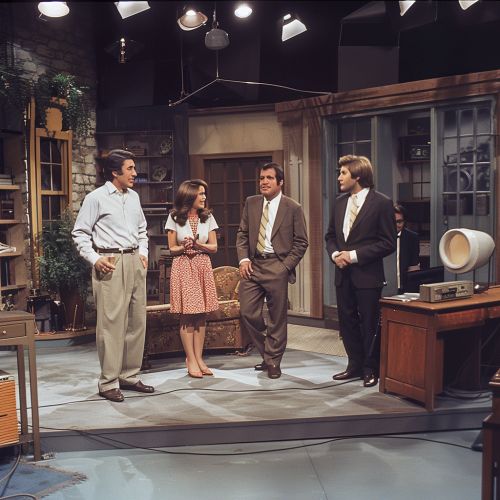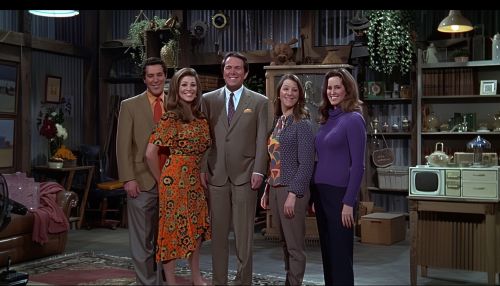The Mary Tyler Moore Show
Overview
The Mary Tyler Moore Show is an American television sitcom that aired on CBS from September 19, 1970, to March 19, 1977. The series was created by James L. Brooks and Allan Burns, and it starred Mary Tyler Moore as Mary Richards, an independent woman focused on her career in the television news industry. The show is noted for its groundbreaking portrayal of a single, professional woman and its influence on subsequent television programming.
Development and Production
The concept for The Mary Tyler Moore Show emerged in the late 1960s, a time of significant social change in the United States. The creators, Brooks and Burns, sought to develop a series that would reflect the evolving roles of women in society. Initially, the character of Mary Richards was conceived as a recent divorcée, but CBS executives were concerned that audiences might associate the character too closely with Moore's previous role as Laura Petrie on The Dick Van Dyke Show. Consequently, the character was reimagined as a single woman who had recently ended a long-term relationship.
The show was produced by MTM Enterprises, a production company founded by Moore and her then-husband, Grant Tinker. The series was filmed at CBS Studio Center in Studio City, Los Angeles.
Cast and Characters
The ensemble cast of The Mary Tyler Moore Show included several notable actors who contributed to the show's success:
- Mary Tyler Moore as Mary Richards: A 30-year-old single woman who moves to Minneapolis to work as an associate producer at the fictional WJM-TV.
- Ed Asner as Lou Grant: The gruff but lovable news director at WJM-TV.
- Valerie Harper as Rhoda Morgenstern: Mary's best friend and neighbor, known for her sharp wit and self-deprecating humor.
- Cloris Leachman as Phyllis Lindstrom: Mary's snobbish and often condescending landlady.
- Gavin MacLeod as Murray Slaughter: The head writer at WJM-TV, who becomes one of Mary's close friends.
- Ted Knight as Ted Baxter: The vain and incompetent anchorman at WJM-TV.
- Betty White as Sue Ann Nivens: The acerbic "Happy Homemaker" who joins the cast in later seasons.


Themes and Impact
The Mary Tyler Moore Show is widely regarded as a pioneering series that addressed several social issues, including gender roles, workplace dynamics, and the changing landscape of American society. The character of Mary Richards was a departure from traditional female roles on television, as she was portrayed as an independent, career-focused woman who did not rely on a man for her identity or success.
The show's depiction of the workplace was also groundbreaking. It presented a realistic and nuanced view of office life, with characters who were flawed and multifaceted. The interactions between Mary and her colleagues at WJM-TV highlighted issues such as sexism, professional ambition, and the challenges of balancing personal and professional lives.
Critical Reception and Legacy
Upon its debut, The Mary Tyler Moore Show received widespread critical acclaim for its writing, acting, and innovative approach to comedy. The series won numerous awards, including 29 Primetime Emmy Awards, making it one of the most honored shows in television history.
The show's influence extended beyond its original run, as it paved the way for subsequent series that featured strong female leads and ensemble casts. Spin-offs such as Rhoda, Phyllis, and Lou Grant further explored the lives of the show's characters and expanded its impact on television.
Cultural Significance
The Mary Tyler Moore Show holds a significant place in American cultural history. It is often credited with helping to shift public perceptions of women in the workforce and contributing to the broader feminist movement of the 1970s. The show's iconic opening sequence, in which Mary Richards throws her hat into the air, has become a symbol of female empowerment and independence.
The series also had a lasting impact on the television industry, influencing the development of future sitcoms and dramas that sought to portray more realistic and diverse characters. The show's emphasis on character-driven storytelling and its blend of humor and serious themes set a new standard for television programming.
Episodes and Story Arcs
The Mary Tyler Moore Show aired for seven seasons, with a total of 168 episodes. The series featured several notable story arcs and episodes that addressed contemporary social issues and character development. Some of the most memorable episodes include:
- "Chuckles Bites the Dust" (Season 6, Episode 7): An episode that masterfully blends comedy and tragedy, as the WJM-TV staff deals with the death of a beloved children's show host.
- "The Lars Affair" (Season 4, Episode 1): An episode that introduces Betty White's character, Sue Ann Nivens, and explores themes of infidelity and friendship.
- "Mary Moves Out" (Season 5, Episode 23): An episode that marks a significant turning point in Mary's life as she decides to move into her own apartment.
Influence on Future Television
The Mary Tyler Moore Show has been cited as an inspiration for numerous television series that followed. Shows such as Murphy Brown, Ally McBeal, and 30 Rock have drawn comparisons to The Mary Tyler Moore Show for their portrayal of strong, independent female protagonists and their workplace settings.
The series also influenced the development of ensemble comedies that focus on character relationships and workplace dynamics. The show's legacy can be seen in contemporary series such as The Office and Parks and Recreation, which similarly blend humor with poignant social commentary.
Awards and Honors
The Mary Tyler Moore Show received numerous accolades during its run, including:
- 29 Primetime Emmy Awards, including Outstanding Comedy Series three times.
- A Peabody Award for excellence in television broadcasting.
- Multiple Golden Globe Awards for Best Television Series – Musical or Comedy and individual acting awards for Mary Tyler Moore and Ed Asner.
The series has been consistently ranked among the greatest television shows of all time by various publications and organizations. In 2013, the Writers Guild of America ranked it #6 on its list of the "101 Best Written TV Series."
